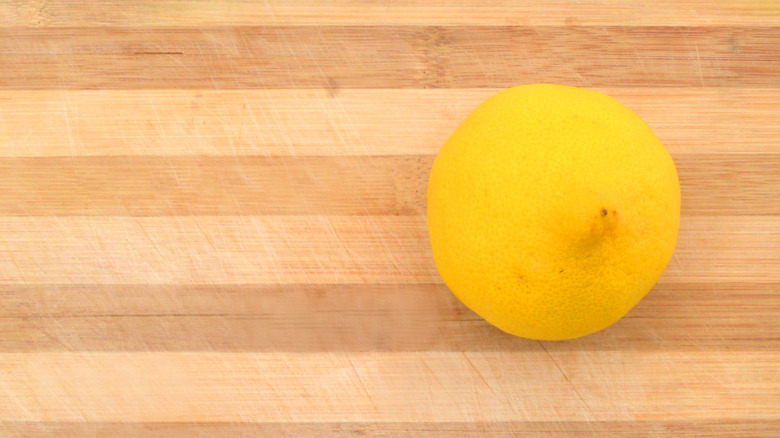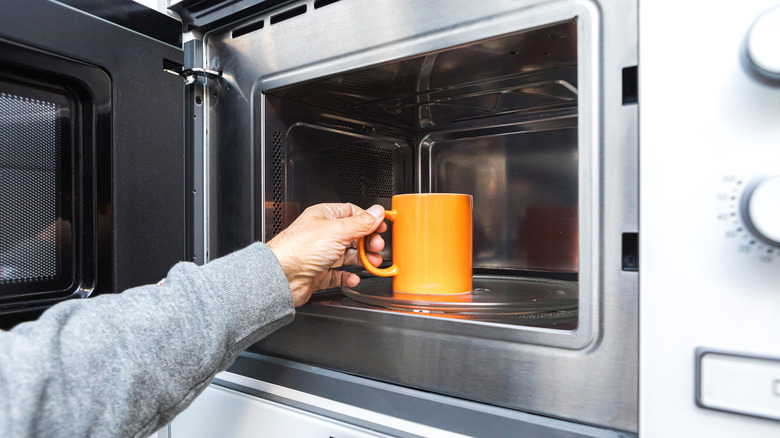Clean Tough Stains On Butcher Block Countertops With Two Kitchen Ingredients
Butcher block countertops are a beautiful addition to any kitchen. Kitchen enthusiasts especially love the wood of butcher blocks for its reputation for protecting against foodborne sickness via its natural antibacterial characteristics that help eliminate bacterial growth. However, the countertops do come with their own set of challenges and require some maintenance to keep them looking their best. Wooden surfaces can be susceptible to staining from spilled liquids, water damage from prolonged exposure to moisture, and bacterial growth if not regularly cleaned and maintained.
While practicing daily maintenance, such as wiping them down with a damp cloth and mild detergent and applying mineral oil to condition the wood, you still may find yourself dealing with tough stains, so there's a natural and effective solution that you can try to keep your butcher block countertops looking pristine: lemon and salt.
Lemons are remarkable for their natural degreasing properties, and their acidic juice is an excellent stain remover. Paired with salt, which acts as a gentle abrasive, this dynamic duo can effectively lift tough stains from the surface of your butcher block countertops.
How to use salt and lemon to clean your butcher block countertops
To harness the power of these simple ingredients to restore the beauty of your countertops, start by simply sprinkling a fair amount of salt onto the surface of the countertop. Then, take a lemon half and use it to scrub the surface gently. While you're doing this, squeeze the lemon to add its juice to the salt. Then, use the lemon halves to vigorously scrub the stained areas of your butcher block countertops, ensuring that the lemon juice and salt mix is applied with firm pressure to penetrate the stain effectively. After you're done scrubbing, just let the salt and lemon juice sit for about five minutes.
Allow the lemon and salt mixture to permeate the stain, enabling the natural acids and abrasives to break down and lift the stain. Afterward, use a damp cloth moistened with distilled vinegar to wipe away the lemon and salt mixture, and then dry the area with a clean, dry cloth. If the stain persists, consider repeating the process or employing a soft-bristled brush to delicately scrub the area. And if your butcher block countertop is a bit more worn than you'd care to admit, there still may be hope, as there is a clever way to give a dearly loved and well-used butcher block new life.
Other ways to use salt and lemon as cleaning agents around the kitchen
The natural cleaning properties of salt and lemon are not only effective on wood surfaces; the abrasive texture of salt and the acidity of lemon juice work together to effectively clean and deodorize many surfaces. Remove stinky, sticky messes from the inside of refrigerators by simply mixing salt with lemon juice and scrubbing the surfaces before rinsing them with water. Clean and brighten pots and pans by making a salt-lemon mixture, scrubbing the pan, and then rinsing and drying thoroughly (as always, spot-check the method beforehand). Moreover, when mixed together, salt and lemon create a natural abrasive cleaner for stainless steel sinks and faucets, leaving them with a natural shine after being scrubbed and rinsed.
A few household uses for lemon juice alone include deodorizing your refrigerator and disinfecting your microwave. For the refrigerator, squeeze the juice from a couple of lemons into a bowl and place it on a shelf in the fridge (replace weekly!). To clean the microwave, squeeze lemon juice into a microwave-safe dish and then add its halves to the juice. Place the dish in the microwave and power it on for three minutes — once complete, let the bowl sit in the microwave for five minutes to allow the steam to work, and then wipe away the food residue with a damp cloth. And finally, repurpose all those used lemons by tossing them into the food disposal to freshen it up.


